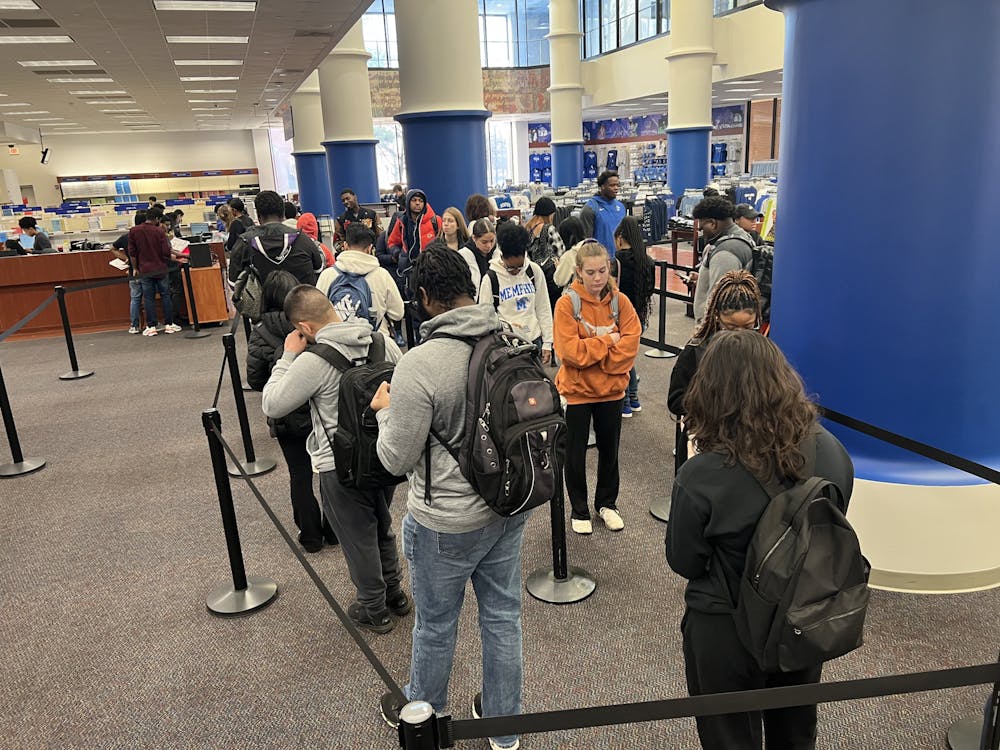The University of Memphis recently unveiled Tigers SmartStart, a new program and textbook distribution service intended to make purchasing textbooks more affordable and convenient for students.
The program, which charges students a flat fee of $24 per credit hour for course materials, including textbooks, access codes, lab manuals and eBooks, has been the subject of controversy, with some students on social media describing it as "confusing" and "a joke."
One reason for the controversy is the opt-out loophole, where students are automatically enrolled in the program unless specified otherwise, in which case they can employ the opt-out option. Another source of confusion is the relatively high cost of the program and how much is covered by financial aid. In order to qualify as a full-time student, the University requires that a student take at least 12 credit hours, which with Tigers SmartStart, equates to nearly $300 in materials costs – a high price for many students.
"I don't see the purpose of them starting the program," said Kaylin Jackson, a freshman culinary arts major. "It's still going to come out of our financial aid, or we have to pay out of pocket for it."
The cost of the program is included in each student's semester balance on TigerExpress, along with other charges such as tuition and fees, and can be allocated with funds from scholarships or financial aid. However, if financial aid does not cover the cost of the program, the student must pay out of pocket or opt out. The program, which is directly linked to each student's myMemphis account, recognizes each student's registered courses and assigns the course materials accordingly.
For example, if the program requires that a student need two hard copy textbooks and one online textbook for their classes, even if the student isn't required to use the two hard copy textbooks by their professor, they would not get a refund for the non-required textbooks. Nor would they be allowed to rent or purchase the online textbook on its own. It's an all-in or all-out program.
As explained by a campus bookstore employee, the program is designed this way to encourage professors and students to utilize curriculum-consistent learning materials.
"All of the professors need to require a book and actually use the book for it to be a successful program," the employee said. "A lot of them don't know about it yet. I'm hoping going forward, more [professors] realize that [many students' textbooks] are already paid for in the bookstore instead of telling their students to go to a [third party] website to buy their books."
The University of Memphis estimates that a full-time undergraduate student will spend $1,600 on textbooks and supplies throughout the 2022-2023 school year. However, in past semesters, many students have found that alternative textbook rental websites like BookFinder, Amazon and Chegg can significantly relieve the cost of textbooks and counter in-store prices.
Olivia Stearman, who uses the website BookFinder to find cheap, oftentimes used textbooks to buy or rent, said she paid $40 total in book costs last semester. The senior advertising major claims she paid more for Adobe software than textbooks. Similarly, Andi Kate Coulston, a sophomore graphic design major, spent $50 on textbooks last semester, as many of her classes required design software and art materials in place of textbooks. Noah Temple, a junior social work major, spent just over $150 on his textbooks. All three students opted out of Tigers SmartStart.
"I buy my books off of Facebook. There's a big nursing group message thing we buy from," said Susan Meadows, a senior nursing major. "At a bookstore, you could spend $600 on nursing textbooks."
Because it is Meadows’ last semester and none of her classes required new textbooks, she too decided to opt out of the program.
"The people that I've been around are like me. We're ending college soon, so it's a bit hard to take advantage of [the program] as much as someone who's in their sophomore year could," she said. "However, I can definitely see how it can be helpful, especially for people who are just starting out college."
Khawalah Almurisi, a sophomore health science major, is one of those students. Almurisi typically spends $500 per semester on her pre-med textbooks. However, with the program this semester, she spent less than $300 for all her required materials.
"I know a lot of people complain, but for me, it was a good thing because I didn't spend that much money," Almurisi said. "Also, for most of the classes, I need access codes, and everything was already on Canvas. I didn't have to go to the desk and ask them for anything."
Similar to Almurisi, Jennifer Gutierrez, a sophomore international business major, requires access codes for many of her classes. Altogether, the cost of this semester's codes exceeded $400, but with Tigers SmartStart, Gutierrez knocked 50 percent off her total.
"For most majors, I think it's a waste of money because you can find most books online for much cheaper or borrow from a friend who already took the class," Gutierrez said. "I think it all depends on the major and what the professor actually demands from the class."
While the cost of the program has been the major talking point, the turbulent distribution of textbooks at the University Bookstore has raised even more questions and concerns.
From backordered to mislabeled textbooks, students are either returning to the bookstore to complain about not having their books, or are sent books belonging to another student.
Jordan Dawe, a sophomore biology major, and Lilia Camarillo-Roning, a sophomore business management major, both received emails saying their books were ready for pick-up, only to be told upon arrival that their books were on backorder. Camarillo-Roning, who already had assignments due for three of her classes, had to email all her teachers and explain the situation. Dawe was told that her books needed to be sent over from the Lambuth campus.
Phoebe Murin, a junior communications major who transferred to U of M last semester, said she's "never seen anything like this" after returning to the book information desk three times to complain about receiving another student's books.
Another complaint of students is the long wait times.
On the first day of classes, one bookstore employee said the line snaked from the book information desk to the automatic doors marking the store entrance from opening to closing.
"With any new system, there are bound to be a few hiccups," said a bookstore employee. "We're still trying to work out the kinks."
While Tigers SmartStart has saved some students hundreds, others see it as an inefficient investment, leaving it up to each student's discretion whether the program will benefit them.
Students have until Friday, Jan. 27, to opt out of the program. They also have the option to opt back in by following a link on the University website. If at any time a student drops a class, they will be refunded the money for that course's materials into their TigerExpress account following a 5-day processing period.






